Rwanda is a country that defies expectations. It’s a place that has emerged from a tragic past with a quiet dignity and a vibrant energy that is palpable. Known as the "Land of a Thousand Hills," its landscapes are a breathtaking canvas of misty, emerald-green volcanoes, deep-blue lakes, and lush, ancient rainforests.
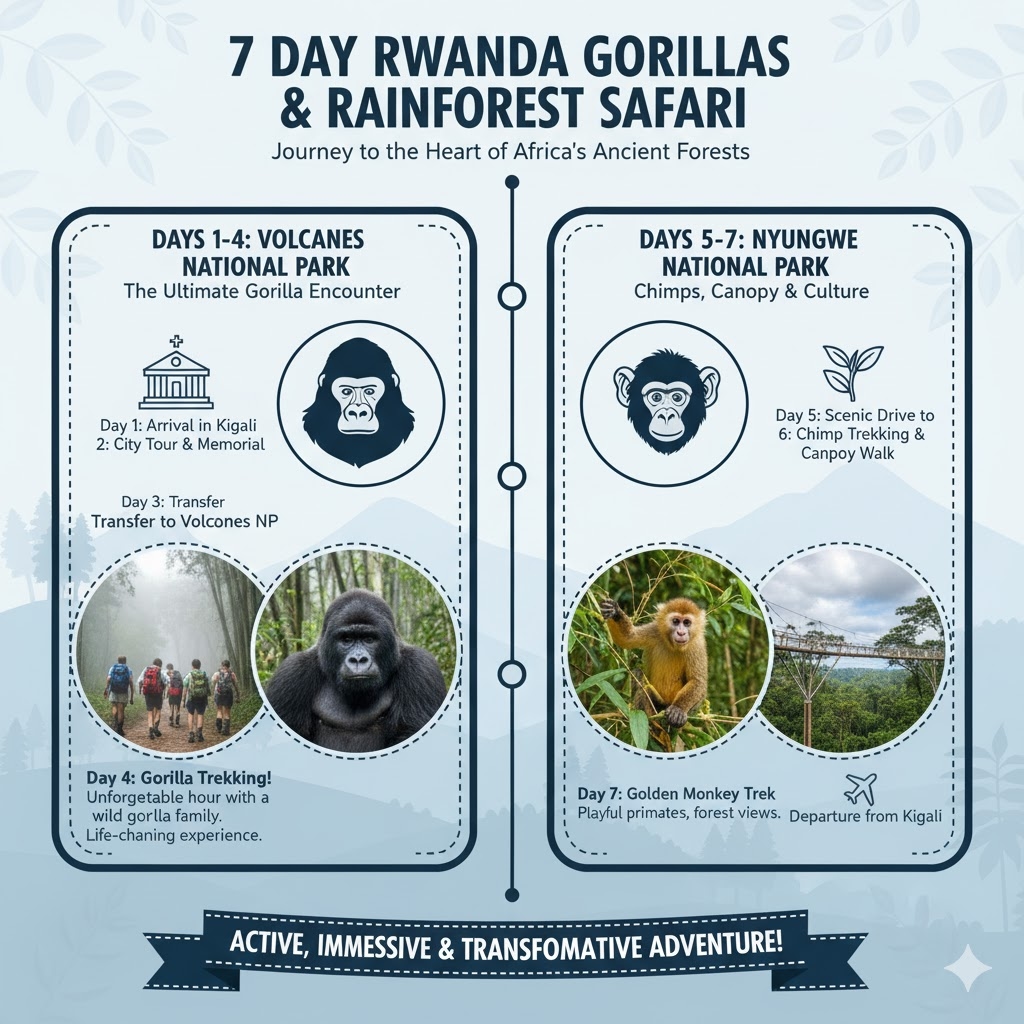
And in those rainforests, an experience awaits that is on par with any on Earth: sitting face-to-face with a family of wild mountain gorillas.
A 7-day trip to Rwanda is a journey into the heart of Africa, combining the life-changing gorilla trek with a deep dive into primate life in Nyungwe Forest. This is not a typical "see it from a jeep" safari; this is an active, immersive, and transformative adventure.
Is Rwanda Safe for Tourists in 2026?
Let's address this first: Yes, Rwanda is widely considered one of the safest, cleanest, and most organized countries in all of Africa. The streets are famously clean (thanks to a ban on plastic bags!), and the government has invested heavily in security and infrastructure.
The country's tragic past is just that—a past. Today, Rwanda is a beacon of unity and progress. You will feel safe, welcome, and respected from the moment you land.
What is the Visa Policy for Rwanda?
Rwanda has one of the most open visa policies in the world. You can check online Eligible Countries for Rwanda eVisa.
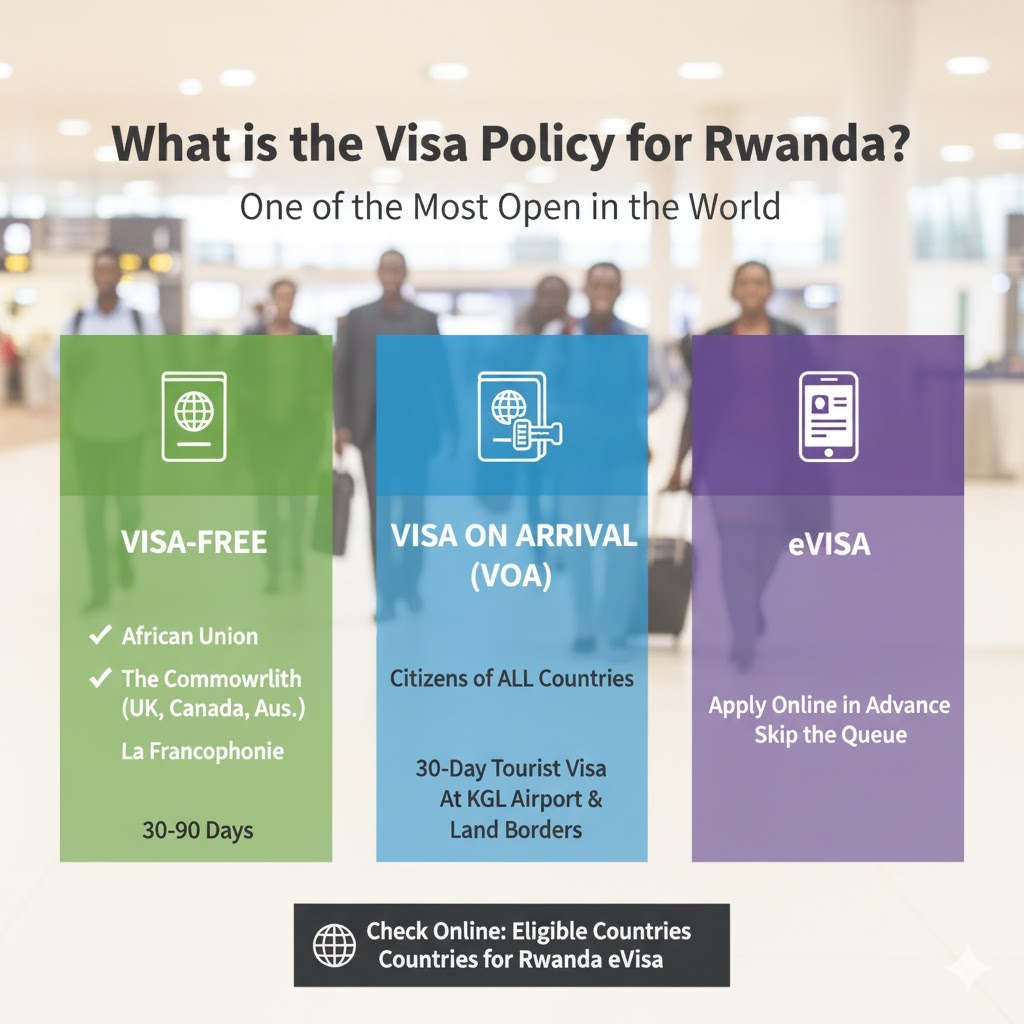
Visa-Free: Citizens of the African Union, The Commonwealth (including the UK, Canada, Australia), and La Francophonie can enter Rwanda visa-free for 30-90 days.
Visa on Arrival (VOA): This is the key. Citizens of all countries can get a 30-day tourist visa on arrival at Kigali International Airport (KGL) or other land borders.
eVisa: You can also choose to apply for an eVisa online in advance to skip the VOA queue.
Should I Get an eVisa Myself, Use an Agent, or Just Get a Visa on Arrival?
This is a great question. Since the Visa on Arrival (VOA) is so easy, why would anyone do anything else? It's a trade-off between cost, convenience, and peace of mind.
Path 1: The DIY Approach (Official Portal or VOA)
Pros: This is the cheapest route. You either apply for on the official government eVisa portal yourself or just show up and get your VOA at the airport. For most travelers with straightforward cases, this works perfectly fine.
Cons: You get zero support. If the government portal is glitchy, your payment fails, or you make a small error, you risk rejection and losing your fee. If you opt for VOA, you may have to wait in a queue after a long flight.
Path 2: The Full-Service Agent Approach
Pros: This is the "stress-free" option. A trusted travel or “evisa-rwanda.com” agent handles everything. They simplify the forms, offer support in your own language, and use secure payment systems. Their #1 value is document verification—they check your passport scans and photos to ensure they won't be rejected for technical reasons. They are available 24/7 (via chat, WhatsApp, etc.) if you have a problem. If you have a complex case (e.g., a past visa rejection, dual nationality), their expertise is invaluable for ensuring a high success rate.
Cons: It costs more. You are paying a service fee for peace of mind.
The Verdict: If your trip is simple, you're a confident traveler, and you're from a VOA-eligible country, the DIY path is easy. If your trip is a complex, expensive safari and you have zero chance of a visa issue, a service agent's fee is a small price to pay for a 100% verified application.
How Much is a Gorilla Permit in Rwanda?
This is the most important number to know: A single gorilla permit in Rwanda costs $1,500 USD per person.
Why is the Gorilla Permit So Expensive (And is it Worth It)?
Yes, the price is high, but it's for a very good reason. This is not a zoo; it's a world-renowned conservation success story.
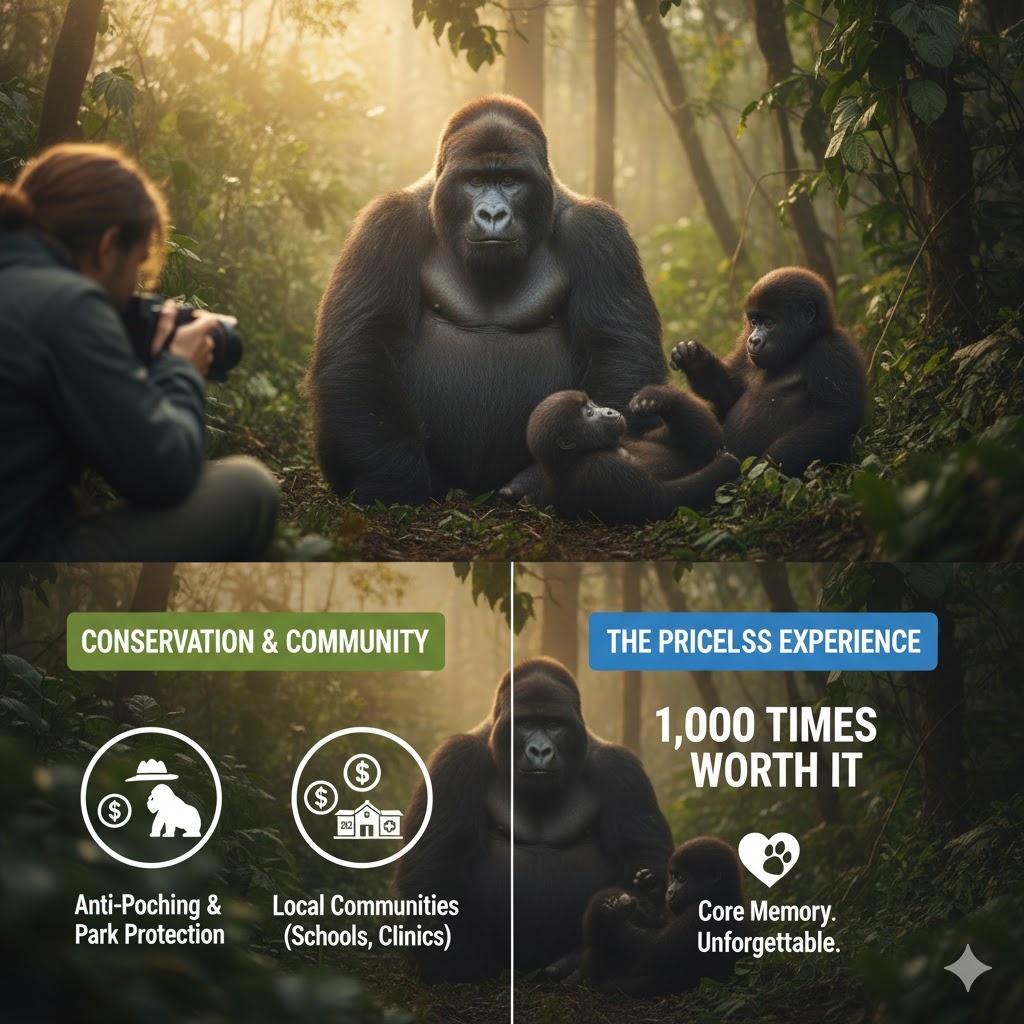
Conservation: Your money directly funds the protection of Volcanoes National Park and the anti-poaching units that safeguard the gorillas.
Community: A significant portion of the fee goes directly to local communities, building schools and health clinics. This makes the gorillas more valuable alive than dead, ensuring the community is invested in protecting them.
Is it worth it? Absolutely, 1,000 times yes. The hour you spend sitting quietly with a gorilla family—watching babies play, the silverback watching over his family—is a priceless, core-memory experience that will stay with you forever.
When is the Best Time to Visit Rwanda?
Rwanda has two main dry seasons, which are the best for trekking:
Long Dry Season: June to September
Short Dry Season: December to February
You can travel in the rainy seasons (March-May, Oct-Nov), and the forests are beautifully lush, but the treks will be significantly muddier and more challenging.
What is Gorilla Trekking Really Like?
This is an active hike, not a walk in the park.
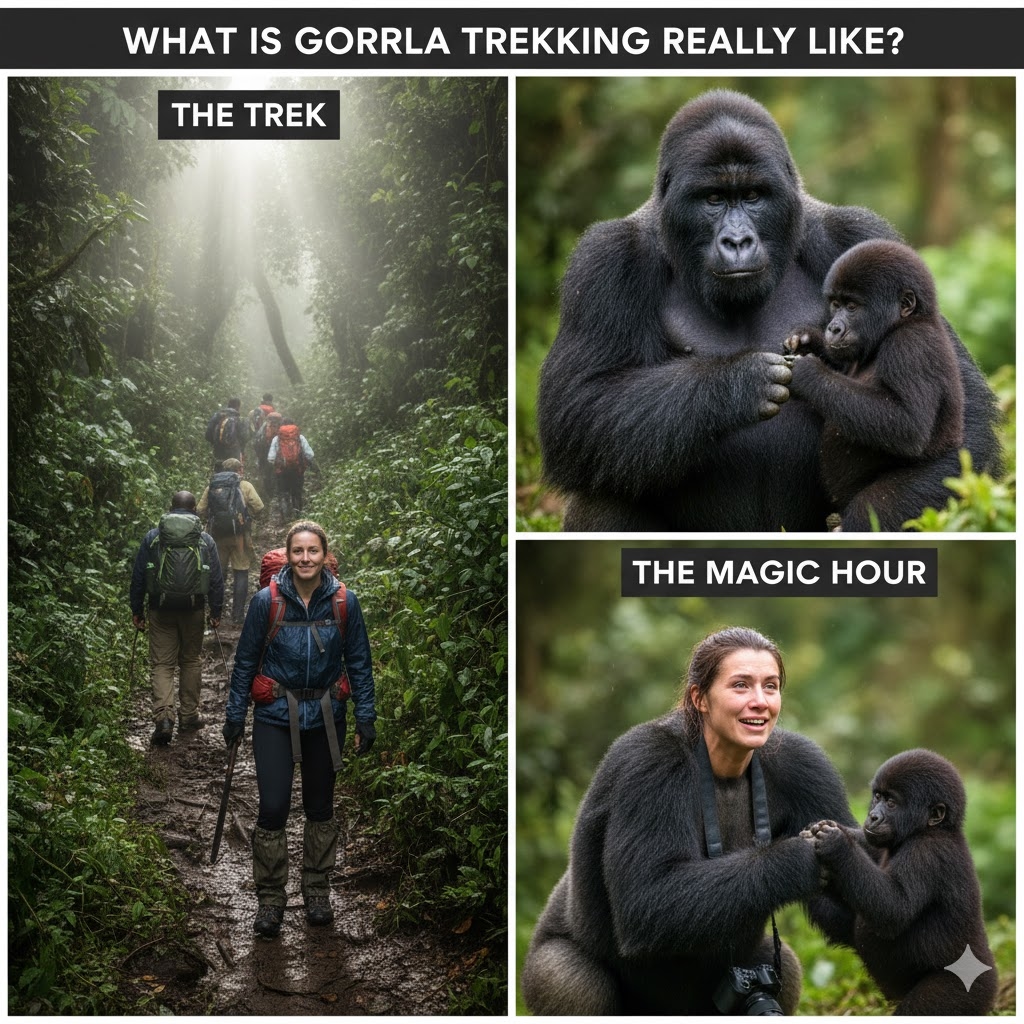
The Morning: You'll wake up before dawn and drive to the park headquarters in Kinigi. You'll be assigned to a gorilla family (based on your fitness level) and a guide.
The Trek: You'll drive to a starting point and begin your hike. You may be hiking for 1 hour or up to 6 hours, depending on where the gorillas are. The trek can be steep, muddy, and at high altitude (7,000-9,000 ft).
The Magic Hour: Once you find the family, your trek is over. You drop your bags, quiet your voice, and spend one magical hour with them. You'll be just feet away.
The Return: After your hour is up, you hike back out.
What's the Difference Between Gorilla and Chimp Trekking?
This itinerary includes both! They are completely different experiences:
Gorillas: Majestic, calm, peaceful. You sit and watch them as they munch on bamboo and groom each other. They are unfazed by your presence.
Chimpanzees: Chaotic, loud, and high-energy. The trek is a high-speed "chase" as they swing, hoot, and holler through the trees. You're on your feet, moving fast. It's thrilling and wild.
How Do You Get Around Rwanda?
While Rwanda has public buses (matatus), they are not practical for a tight safari itinerary. The best (and most common) way to get around is by hiring a private 4x4 vehicle with a driver/guide.
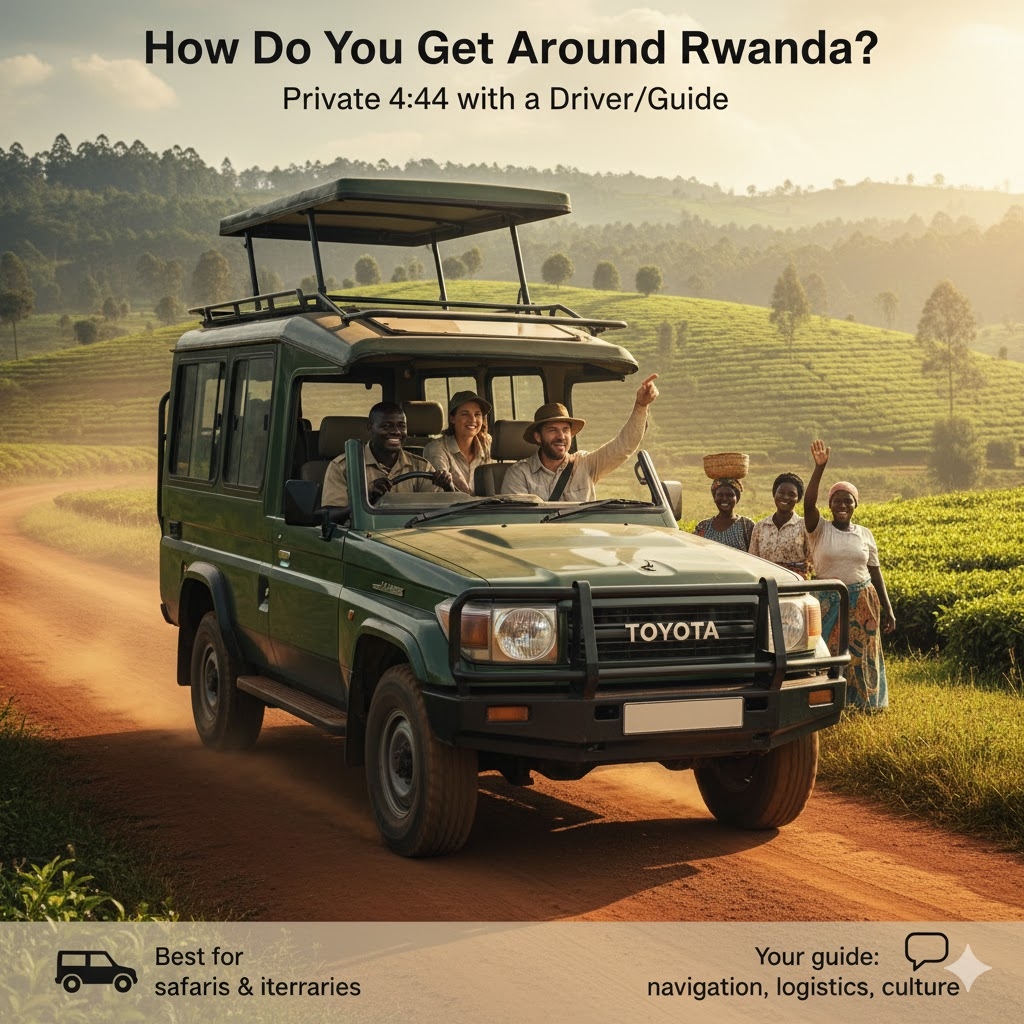
This is often arranged as part of your safari package. Your guide is your key to the country—they handle navigation, checkpoints, and park logistics and provide invaluable insight into the culture.
Your 7-Day Rwanda Gorillas & Rainforest Itinerary
This route offers the perfect blend of primate encounters, stunning scenery, and cultural education.
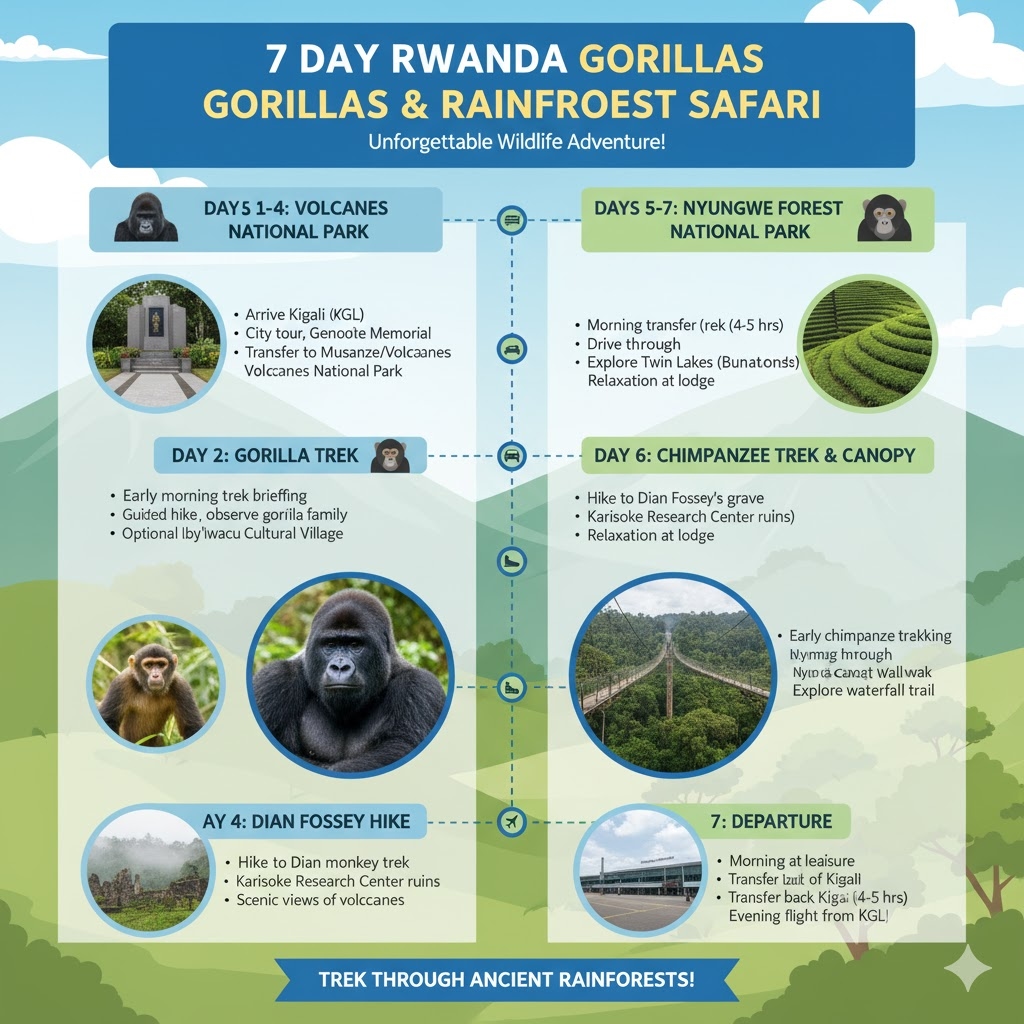
Day 1: Arrival in Kigali
Welcome to Kigali! You'll land at Kigali International Airport (KGL) and be struck by how clean, green, and modern the city is. Transfer to your hotel and relax.
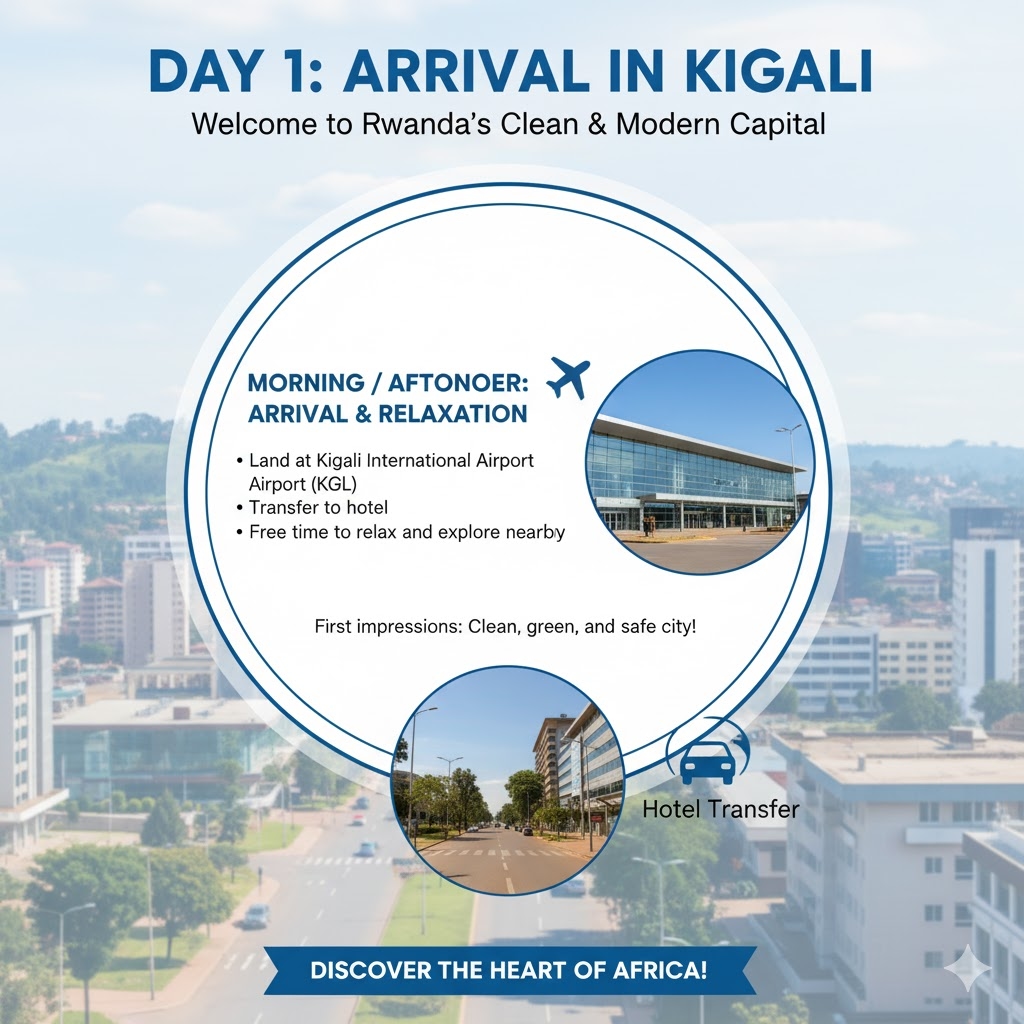
Day 2: Kigali City Tour: Understanding the Past & Present
You cannot understand modern Rwanda without acknowledging its past. Start your day with a visit to the Kigali Genocide Memorial. It is a profoundly moving, heartbreaking, and essential experience that provides the context for the country's incredible story of reconciliation.
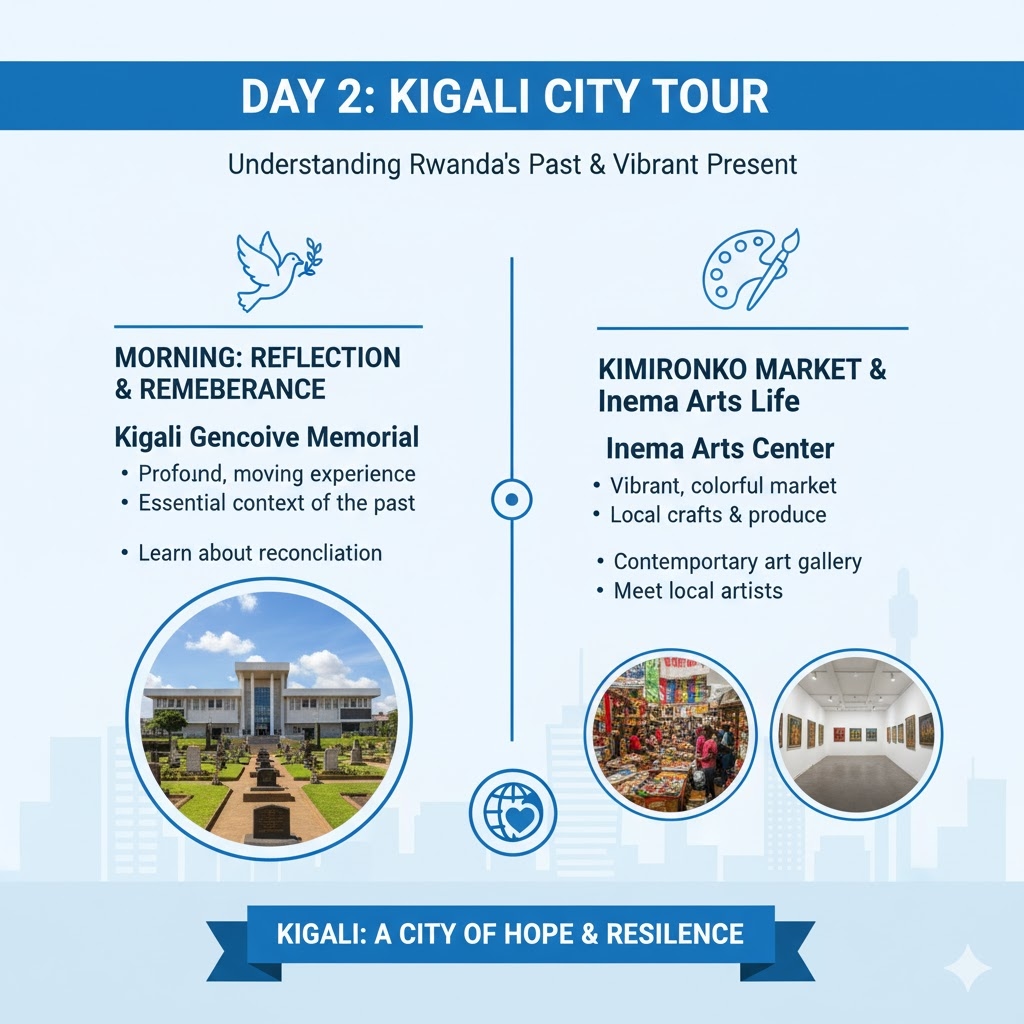
In the afternoon, see the city's vibrant present. Explore the colorful Kimironko Market and visit the Inema Arts Center.
Day 3: Transfer to Nyungwe National Park
Today is a scenic 5-6 hour drive south to Nyungwe National Park. The journey itself is an event, winding through the "thousand hills" with stunning views. Nyungwe is one of the oldest and most biodiverse rainforests in Africa, home to 13 primate species.
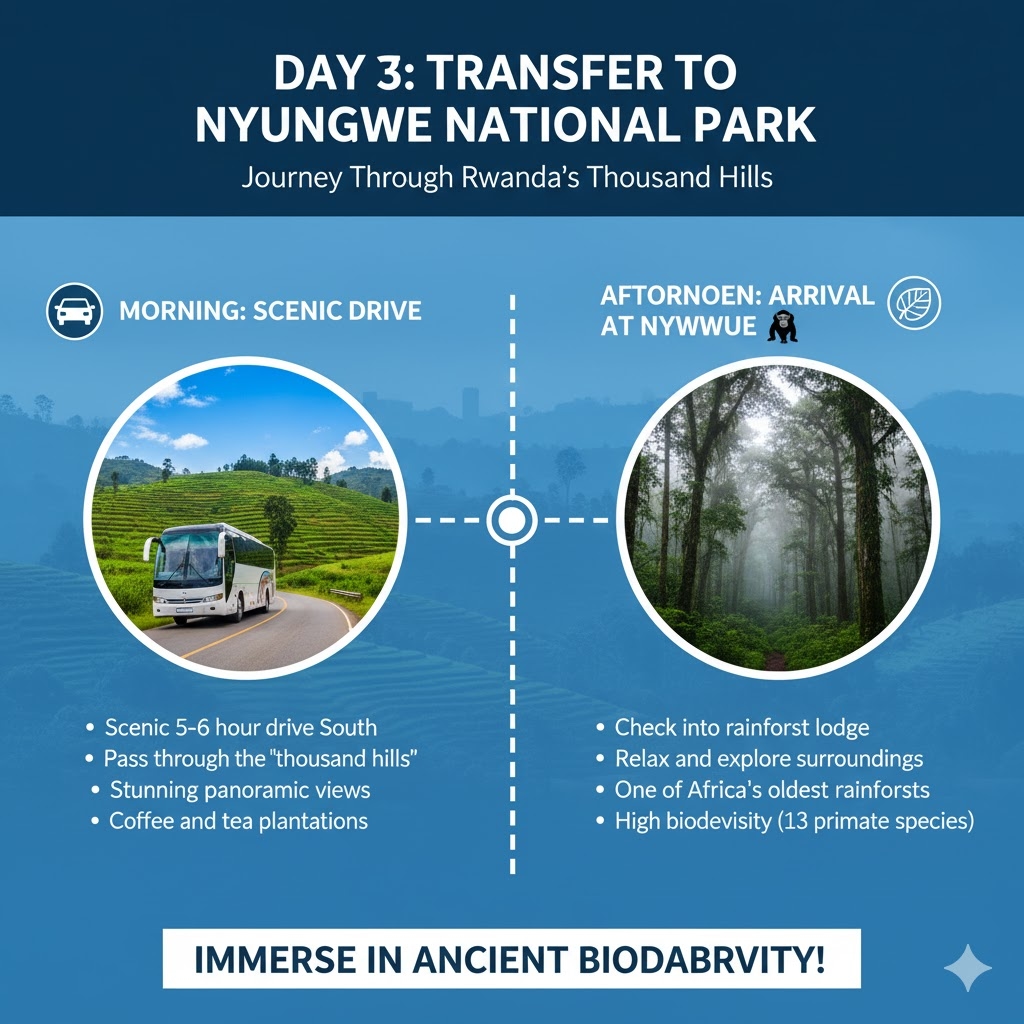
Day 4: Nyungwe: Chimp Trekking & Canopy Walk
Wake up early for your chimpanzee trek! Listen for their calls echoing through the forest as your guide leads you through the dense jungle. After your trek, experience the forest from a different angle on the Nyungwe Canopy Walk. This 70-meter-high, 160-meter-long suspension bridge offers a bird's-eye view of the ancient rainforest.
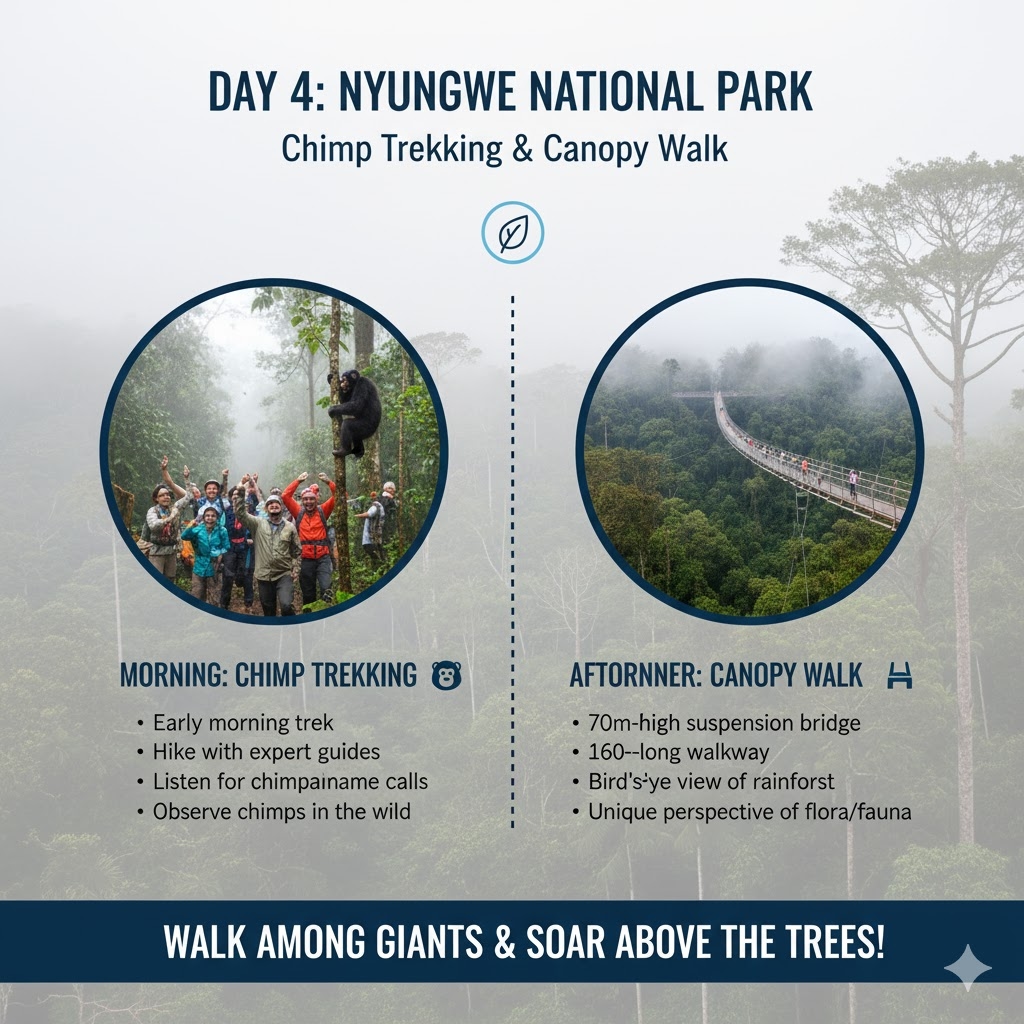
Day 5: Scenic Drive to Volcanoes National Park
Today is another beautiful travel day. You'll drive north (approx. 5-6 hours) along the scenic shores of Lake Kivu, one of Africa's Great Lakes. You'll arrive in the town of Musanze (formerly Ruhengeri), the gateway to Volcanoes National Park and your base for the main event.
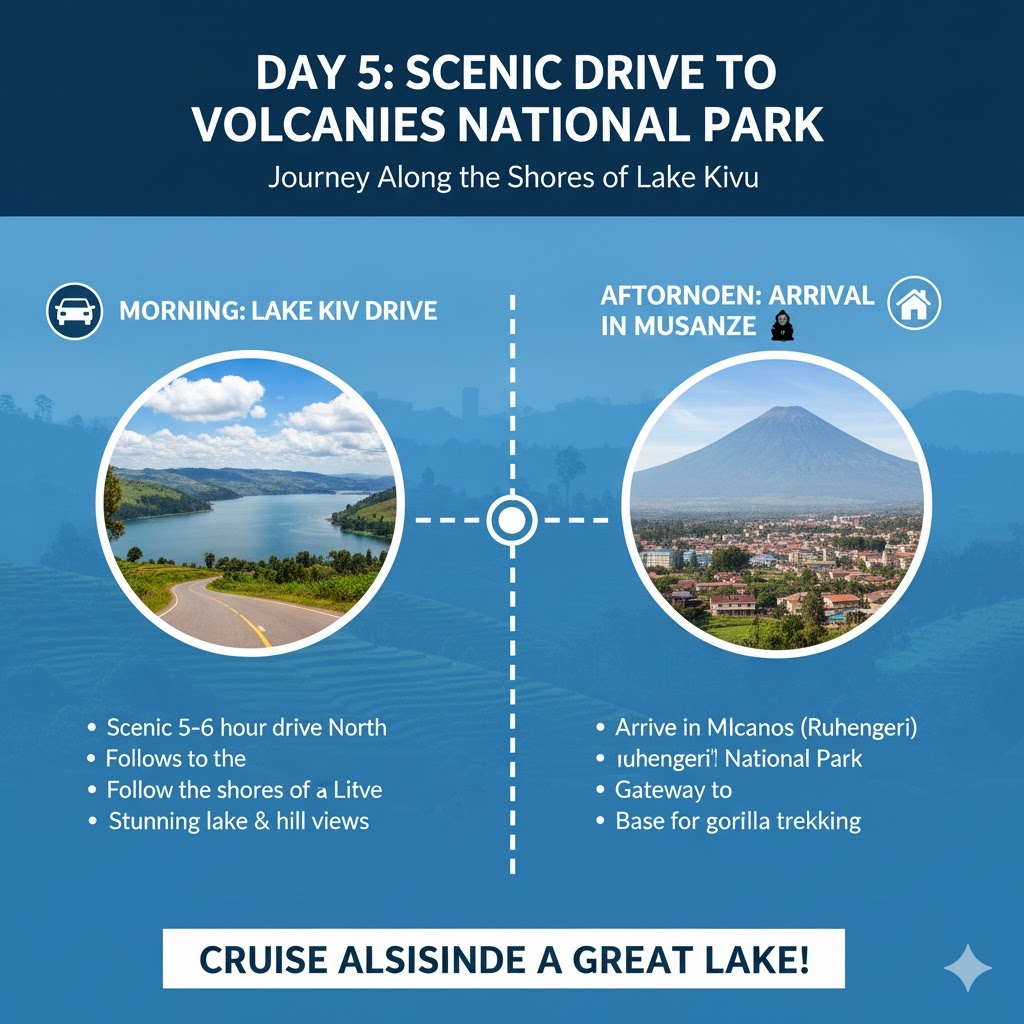
Day 6: The Main Event: Mountain Gorilla Trekking
This is the day. After your early breakfast, you'll head to the park headquarters for your briefing. You'll be assigned a gorilla family, and your trek will begin. After hiking through the bamboo forest, you will spend one unforgettable hour with these gentle giants. It is a life-changing, magical, and deeply emotional experience.
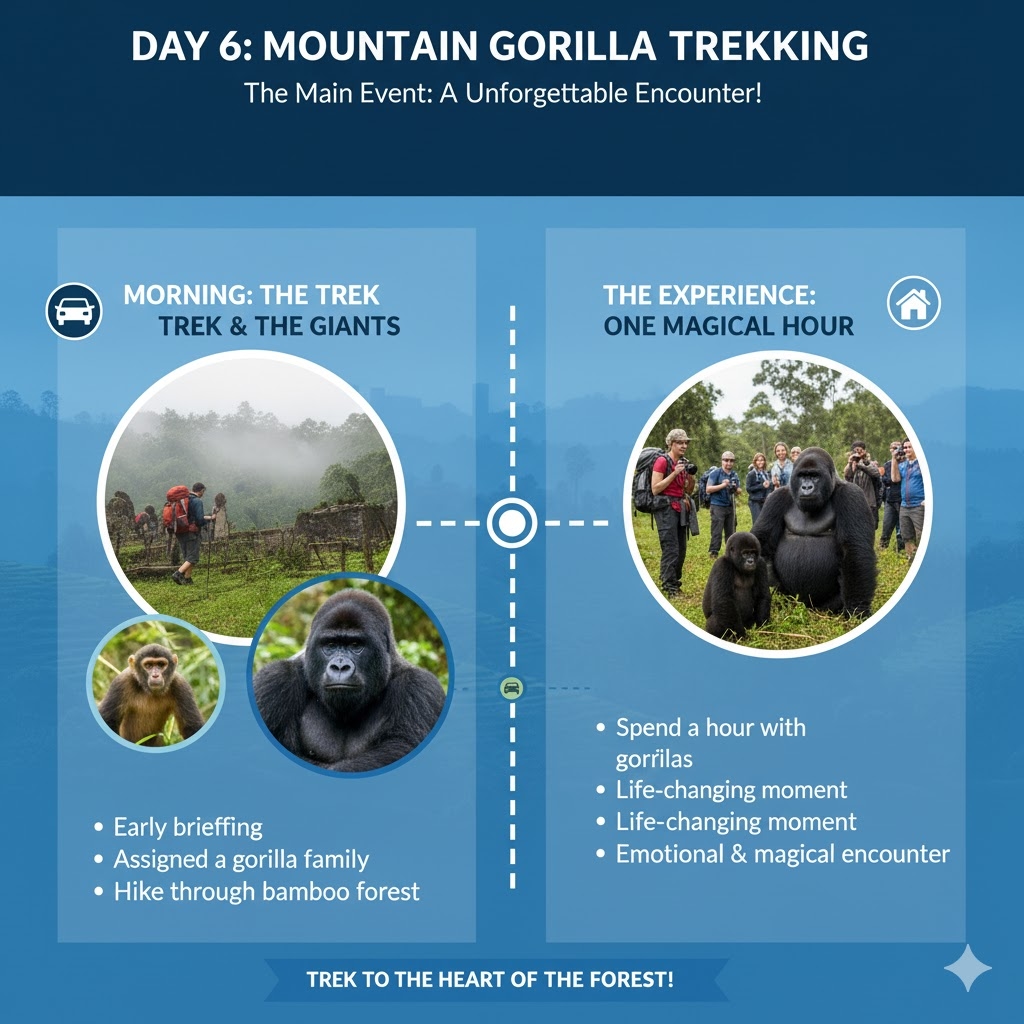
Day 7: Golden Monkeys & Departure
Don't leave the volcanoes just yet! Embark on a final, easier trek to see the Golden Monkeys. These playful, endangered primates are a joy to watch as they leap through the bamboo.
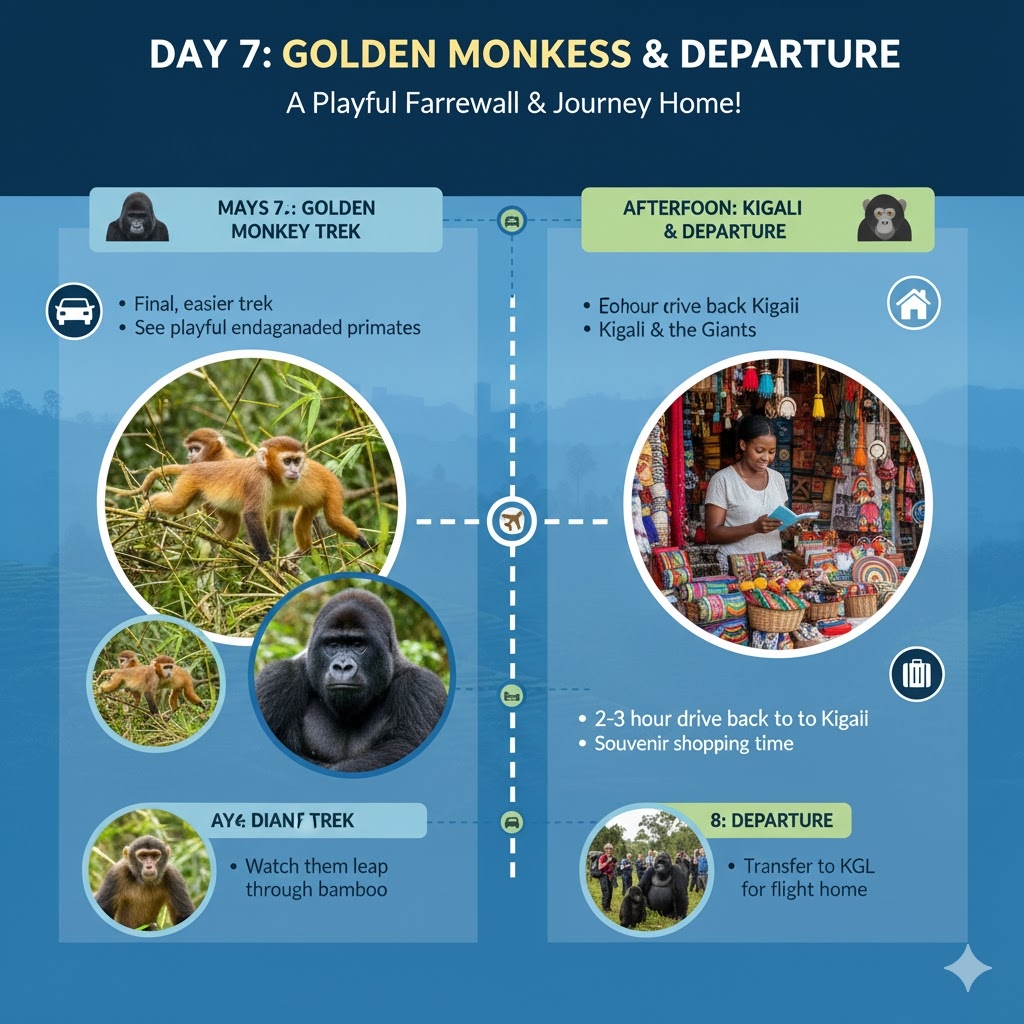
After your trek, you'll make the 2-3 hour drive back to Kigali, filled with memories. You'll have time for some last-minute souvenir shopping before heading to KGL for your flight home.
What Vaccinations Do I Need for Rwanda?
This is a critical travel-planning step. Always consult a travel doctor 4-6 weeks before your trip.
Mandatory: A Yellow Fever vaccination certificate is mandatory if you are arriving from (or have transited for >12 hours in) a country with risk of yellow fever transmission (e.g., Kenya, Uganda, Brazil).
Recommended: Most travel clinics will recommend vaccinations for Hepatitis A, Typhoid, and Tetanus.
Malaria: Rwanda is a malaria zone, especially at lower altitudes (like Akagera). You will need to take anti-malarial prophylaxis. Consult your doctor for the best option for you.
What If I Want a 'Big 5' Safari? (About Akagera National Park)
This 7-day itinerary is primate-focused. If your dream is a classic "Big 5" (Lion, Leopard, Elephant, Rhino, Buffalo) savannah safari, you need to know about Akagera National Park.
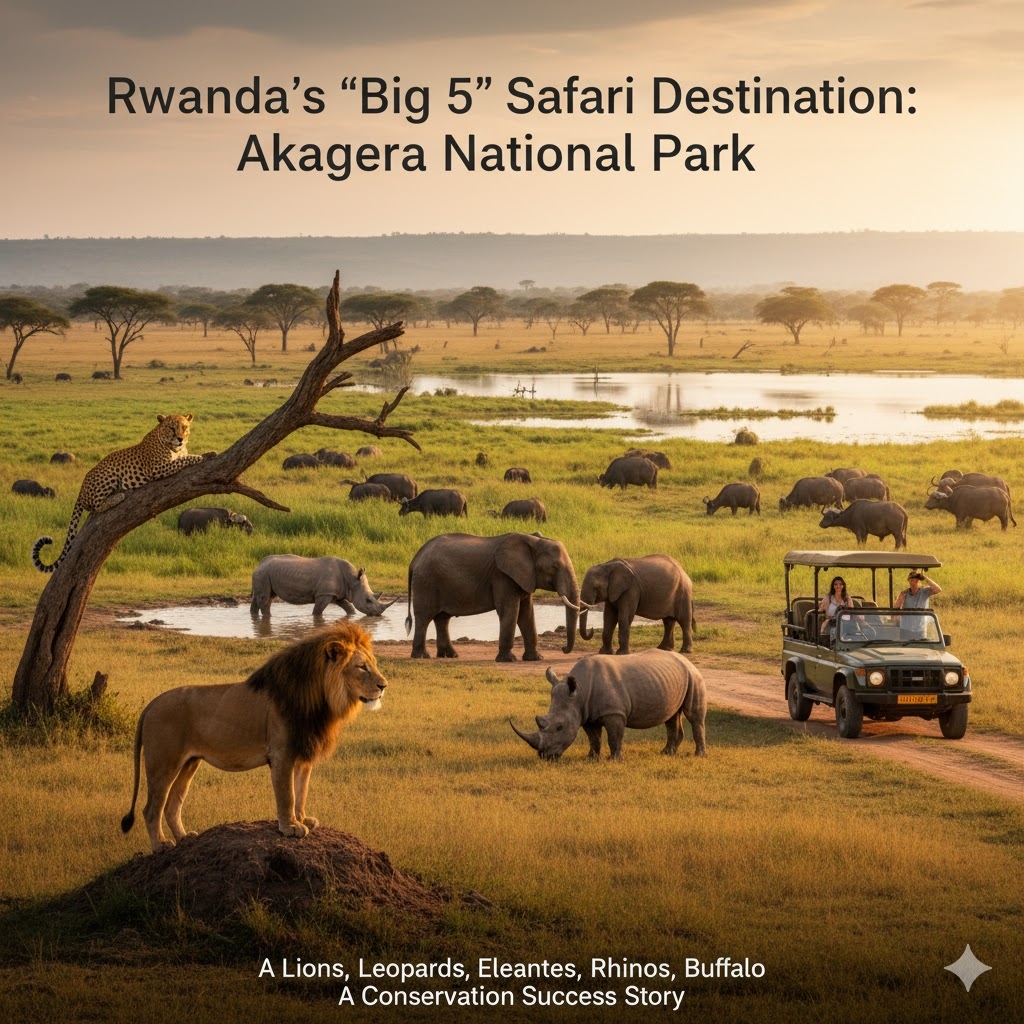
Akagera is a stunning conservation success story. Located in eastern Rwanda (against the Tanzanian border), the park's lions and rhinos were reintroduced, and it's now a thriving Big 5 destination.
You cannot fit Akagera, Nyungwe, and Volcanoes Park into a 7-day trip. To include Akagera, you would need a 10-12 day itinerary, or you would have to replace Nyungwe (the chimp trekking) with 2-3 days in Akagera.
What is Traditional Rwandan Food Really Like?
Rwandan food is hearty, fresh, and delicious, but not spicy. It's often served buffet-style, even in local restaurants.
Ibiharage: Beans are a staple, often in a thick, savory sauce.
Ugali (or Ubugari): A stiff porridge made from maize or cassava flour, used to scoop up sauces.
Isombe: Pounded cassava leaves, often cooked with spinach, onions, and ground peanuts.
Brochettes: The most popular fast food. These are grilled skewers of meat (usually goat or beef) or fish (tilapia from Lake Kivu).
Agatogo: A plantain-based stew, often with meat and a tomato-onion sauce.
Is Tipping Customary in Rwanda?
Tipping is not mandatory in local culture but is expected and highly appreciated in the tourism industry, as it forms a significant part of the guides' income. Be prepared with USD and RWF for tips.
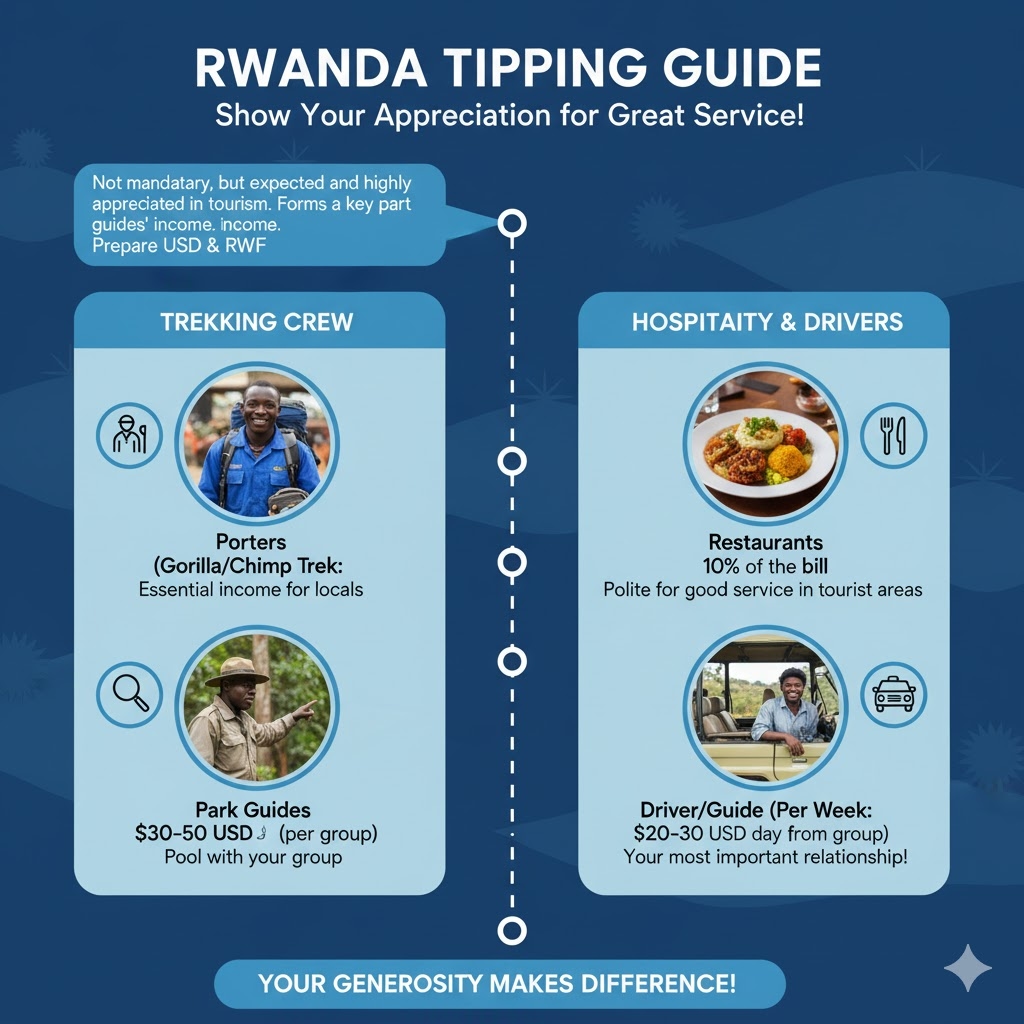
Restaurants: 10% is polite at tourist-focused restaurants in Kigali.
Porters (Gorilla/Chimp Trek): $10-$15 USD. This is non-negotiable in practice. These are locals, and this is a key source of income.
Park Guides (Gorilla/Chimp): $30-$50 USD (per group, which you can pool).
Driver/Guide (for the week): This is your most important relationship. A good tip is $20-$30 USD per day from the group.
A Note on Sensitive Conversation
When you visit the Kigali Genocide Memorial, you'll learn about the 1994 Genocide against the Tutsi. This is a living memory, not distant history. Rwandans have worked incredibly hard to foster unity.
It is considered rude and insensitive to ask a local "Are you Hutu or Tutsi?" The post-genocide identity is "Rwandan." Be respectful, let locals guide the conversation, and be a compassionate listener.
What is 'Umuganda' and Will it Affect My Trip?
Umuganda is a unique Rwandan practice. It is a mandatory community clean-up day held on the last Saturday of every month from 8 a.m. to 11 a.m.
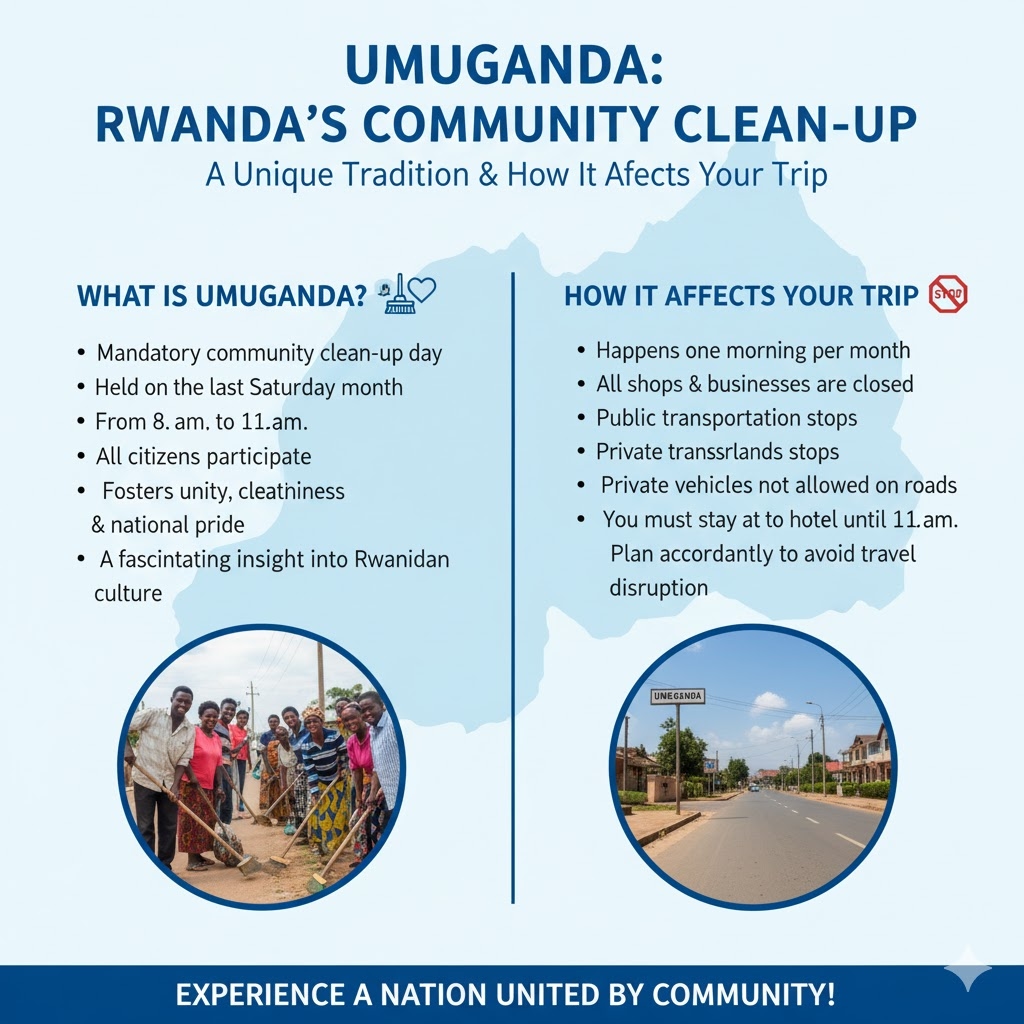
If your trip overlaps with this, it will affect you. All shops are closed, and public transportation (including private drivers) is not allowed on the roads. You will have to stay at your hotel until it's over. It's a fascinating insight into the country's commitment to community and cleanliness.
What Currency is Used in Rwanda?
The official currency is the Rwandan Franc (RWF). You'll use this for small purchases, food, and tips. However, US Dollars (USD) are essential. Your gorilla permit, hotels, and driver/guide will all be paid for in USD. Make sure to bring crisp, new bills (printed after 2013).
What Should I Pack for a Gorilla Safari?
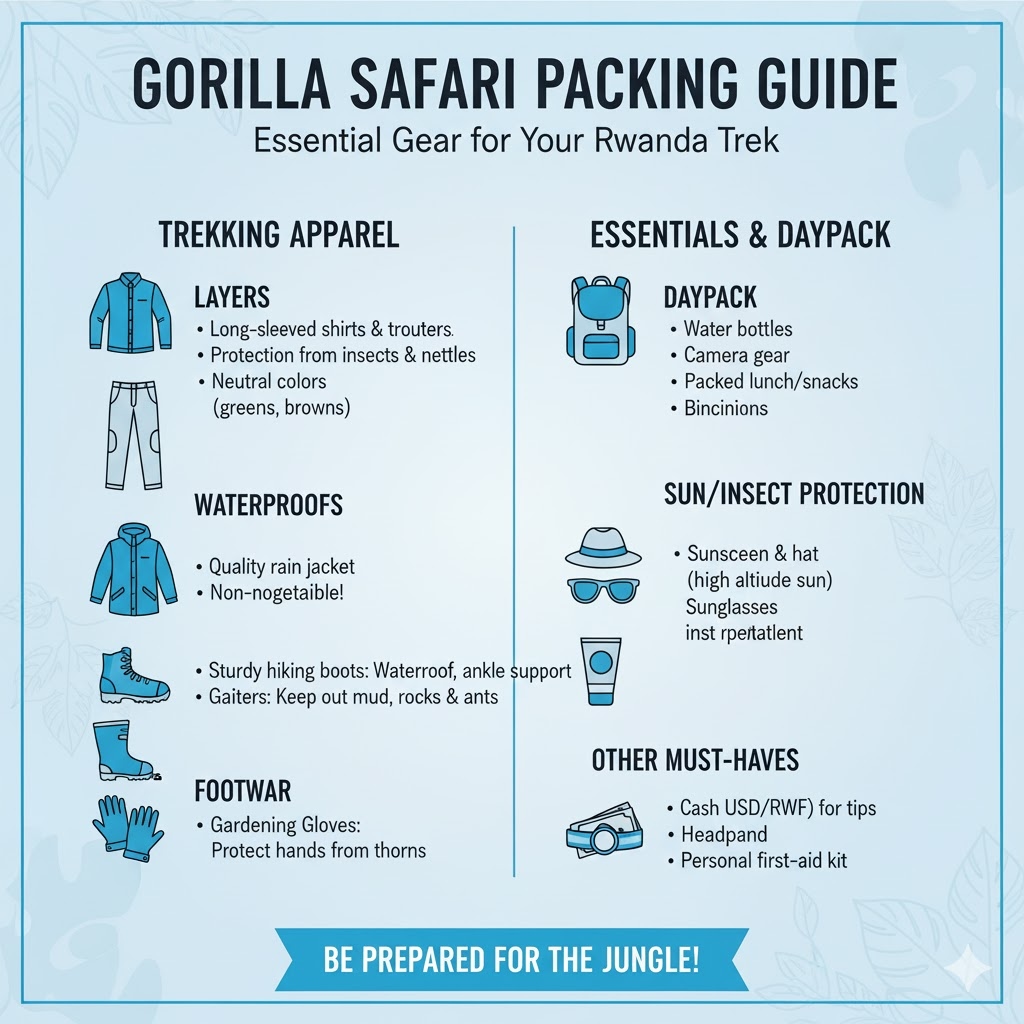
Layers: Long-sleeved shirts and trousers (to protect from insects and nettles).
Waterproofs: A good quality rain jacket is non-negotiable.
Hiking Boots: Sturdy, waterproof, and with good ankle support.
Gaiters: To cover your boots and keep mud, rocks, and ants out.
Gardening Gloves: To protect your hands as you grip branches and thorns.
Daypack: To carry water, your camera, and your packed lunch.
Neutral Colors: Wear greens, browns, and khakis. Avoid black/blue (attracts tsetse flies) and bright colors.
Is English Widely Spoken in Rwanda?
Yes. While Kinyarwanda and French are common, English is an official language and is widely spoken in Kigali and in all tourism-related areas. You will have no problem communicating.
What is the "Kwita Izina" Ceremony?
If you visit in September, you might catch Kwita Izina! It's a massive, star-studded annual ceremony where baby gorillas born in the last year are given their names. It's a huge celebration of conservation.
What is the Ban on Plastic Bags in Rwanda?
This is a crucial tip: Plastic bags are illegal in Rwanda. Do NOT pack items in plastic duty-free bags. Your luggage will be searched at the airport, and any plastic bags will be confiscated. This is a key reason the country is so pristine.
A Final Word
A trip to Rwanda is more than a vacation. It's an investment in conservation, a lesson in resilience, and an encounter with a kind of magic you will never, ever forget.
